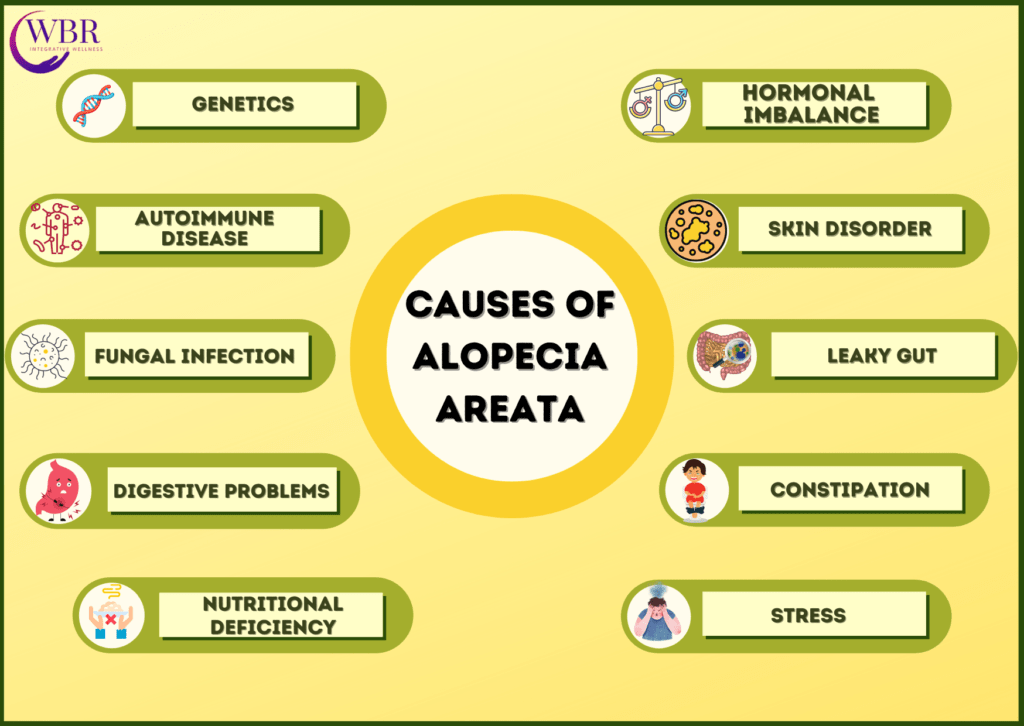How to Manage Alopecia Areata Naturally?
Alopecia areata is basically a generic medical term for hair loss. It is an autoimmune disease and two percent of the world population is affected by this disease. Though it is not a serious physical condition, but psychologically, it can be a stressful situation for anyone. Most people don’t know the real reason behind the hair loss and they start taking random treatment and that only speeds hair loss. But it doesn’t mean that the hair can not be grown back, but treatment plan should address the root cause and that will help hair to regrow. In this blog we unfold the causes, symptoms and potential natural management of alopecia areata.
What Is Alopecia Areata?
Alopecia areata is an autoimmune condition (involving T cells), in which the immune system attacks hair follicles which can cause patchy hair loss. It is present commonly on the scalp, beard, eyebrows, it can affect almost any area on the body with hair follicles.
Alopecia areata is a Latin word that means alopecia= “baldness” and areata= “patches”. In most cases, hair falls out in small circular patches across the scalp.
Who Can Get Affects Alopecia Areata?
This condition can affect another part of the face or body as well and regardless of gender and age, anyone may face this condition, though it has been seen that the majority of cases occur before the age of 30.
In addition, if you have any family history of this autoimmune condition such as diabetes, lupus, R.A, or thyroid (Hashimoto’s Thyroiditis), there is a chance that you may develop alopecia areata in the future.
Regardless the gender and age, AA may affect anyone.
Alopecia Areata In Men
Alopecia areata is likely to be more significant in male. Majority of affected men have a family history of hair loss/ baldness condition.
Alopecia Areata In Women
Women can also be a victim of this condition. The reason is still not clear, the hair loss can occur on eyebrows, eyelashes, or scalp as well.
Alopecia Areata In Children
Children may also experience alopecia areata condition, and it is not always genetic, children with this condition may not have parents with this disease. In children, nail defect is also very common with hair loss. Hair loss can be traumatizing for some children as they may develop the feeling of aloofness. It is very crucial to deal with children carefully as they are already emotionally drained because of baldness or patchy scalp or losing one-third of the eyebrow.
It can be challenging to use conventional medications such as corticosteroid creams, topical immunotherapy if hair loss is on the eyebrow as both ophthalmologists and dermatologists are to be consulted frequently.
Types Of Alopecia Condition
There are many types of alopecia conditions, alopecia areata is the most common condition. There forms are:
- Alopecia areata totalis: complete hair loss on the head.
- Alopecia areata universalis: complete hair loss of the entire body including eyebrows, eyelashes, asms, legs, and pubic hair.
- Diffuse alopecia areata: causes sudden thinning of the hair.
- Ophiasis alopecia areata: Band shape hair loss around the sides and back of the head.
What Are The Common Symptoms Of Alopecia Areata?
The major symptom of alopecia is hair fall. You may notice:
- Small patches on the scalp, face or other parts of the body
- These patches may get bigger into the bald spot
- There would be no pain, rashes or redness on bald patches
- Sometime, you may feel an itching or burning sensation at the point from where the hair falls out
- Hair may grow back in one spot and fall out on the other part
- Sudden loss of hair over a short period of time
- Hair fall increases, especially in cold weather
- Nails become brittle and pitted
- Nail loses their shine and become rough
What Can Be The Possible Causes Of Alopecia Areata?
In autoimmune disease condition when, your immune system attacks the cells in hair follicles, and that affects the hair health and make them shrink and thin. The reason, what causes this attack on the hair follicle is still not known, the little less known fact is learning about the conditions that may cause this trigger, some includes:
- A family history
- Malnutrition
- D3, Vit C and B complex Deficiency
- Iron, Zinc and Iodine Deficiency
- Skin Disorder like Eczema
- Autoimmune Disease (Diabetes & Thyroid)
- Low Immunity
- Fungal Infection
- Hormonal Imbalance
- Genetics
- SIBO
- Leaky Gut
- Constipation
- Digestive Problems such as bloating, gas, acid reflux, etc.

Can Alopecia Be Managed Naturally?
-
Probiotics & Fibers
Our gut microbiome controls our immune system. Probiotics & Fibers may help to treat many autoimmune diseases including alopecia areata. Consuming probiotic supplements may help to reduce inflammation. Some probiotic foods are kefir, kombucha, cultured vegetables, yogurt, etc. And Some fiber sources are apple, dates, citrus fruits, oatmeal, brown rice, nuts, vegetables with edible skin.
-
Eat Anti-Inflammatory Diet
In treating an autoimmune disease naturally, it is very crucial to lowering the inflammation and allow your body to heal quickly. start consuming an anti-inflammatory diet, such as green leafy, cruciferous vegetables, nuts, seeds, spices, etc. Nutritional deficiencies are the most commonly seen in alopecia areata patients. So eat a balanced rainbow diet to avoid any kind of deficiency.
-
Zinc
Zinc is a trace element and plays a crucial role to boost your immune system and healthy gut. Zinc is also important for the functional activities of the hair follicles. Research showed that, in Alopecia areata condition, low zinc level is the common among the patients.
Zinc supplements and high zinc food such as pumpkin seeds, chickpeas, cashews, yogurt, and spinach, etc. Can be beneficial for patients with a zinc deficiency.
-
Iodine-Kelp
Kelp is a good source of Iodine and iron. Iodine kelp support thyroid health and also clears the follicles and roots and protects the scalp from infections being antimicrobial.
-
Vitamin Support
- Vitamin B Complex- Vitamin B12 deficiency may cause hair loss and Vitamin B12 might stimulate hair growth.
- Vitamin C- Good for skin and scalp health.
- Vitamin D- Correction of vitamin D deficiency enhance the response against alopecia areata treatment.
-
Ginseng
Ginseng is an effective and natural herbal medicine that contains many pharmacological compounds. It helps to reduce inflammation and supports the body to maintain immune homeostasis. Ginseng is available in many forms such as powdered, dried, and tablets.
-
Lavender Essential Oil
Lavender oil works as a powerful antioxidant. It has the ability to heal and protect the skin and reduce inflammation. It helps to increase the hair follicle and thickened the dermal layer.
-
Rosemary Essential Oil
Rosemary oil increases cellular metabolism and stimulated hair thickness and growth. It can also be used to treat dry scalp and dandruff, just apply 2-3 drops of rosemary oil directly to the affected area.
-
Physical Activity
Some studies show that regular exercise or any sort of physical activity may prevent hair loss, as it improves blood flow to the scalp.
-
Stress Management
Stress is an important factor associated with alopecia areata. For your hair to grow back quickly, it is important to manage your stress effectively. You may try a number of stress relievers activities such as yoga, meditation, emotional support etc.
-
Acupuncture Technique
Acupuncture is an effective natural treatment for alopecia areata, as it stimulates the hair follicles, reduces inflammation, and induces blood circulation in the affected area.
Precautions
Though all the natural treatments for alopecia areata are safe for oral and topical use. It is advised to ask your health care provider first, that as per your age, gender, and condition which would be the most suited treatment for you, and if you notice any adverse effect, immediately stop using the herb, oil, or supplement.

Conclusion
Alopecia areata is not a serious health condition, but it may cause psychological trauma and anxiety. Not having hair can be depressing sometimes, but the hair can grow back. Exploring support groups may help you to deal with the emotional outbreak.
If you notice a heavy hair fall in a short period, always consult with your health care provider. There may be some different reasons other than alopecia areata.










